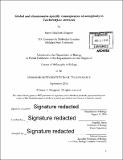| dc.contributor.advisor | Angelika Amon. | en_US |
| dc.contributor.author | Dodgson, Stacie Elizabeth | en_US |
| dc.contributor.other | Massachusetts Institute of Technology. Department of Biology. | en_US |
| dc.date.accessioned | 2017-01-30T19:15:48Z | |
| dc.date.available | 2017-01-30T19:15:48Z | |
| dc.date.issued | 2016 | en_US |
| dc.identifier.uri | http://hdl.handle.net/1721.1/106730 | |
| dc.description | Thesis: Ph. D., Massachusetts Institute of Technology, Department of Biology, 2016. | en_US |
| dc.description | Cataloged from PDF version of thesis. "September 2016." | en_US |
| dc.description | Includes bibliographical references. | en_US |
| dc.description.abstract | Aneuploidy, an unbalanced karyotype in which one or more chromosomes are present in excess or reduced copy number, causes an array of known cellular phenotypes including proteotoxicity, genomic instability and slowed proliferation. Organisms with constitutional genomic imbalance are less fit than their euploid counterparts, and aneuploidy is the leading cause of spontaneous abortion in humans. Although much has been discovered about the phenotypic consequences of aneuploidy over the past decade, an unbiased investigation into aneuploid cell biology was previously lacking. We performed high-throughput screens for genes whose deletion has a synthetic fitness cost in aneuploid Saccharomyces cerevisiae cells containing single extra chromosomes. This analysis identified genes that when deleted decrease the fitness of specific disomic strains as well as those that impair the proliferation of a broad range of aneuploidies. We find that single gene duplications can cause severe phenotypic impact in aneuploid yeast and that aneuploid cells, regardless of karyotype, exhibit protein secretion and cell wall integrity defects, highlighting the complexity of aneuploid cell biology. Additionally, we identify a deubiquitinase, Ubp3, whose deletion broadly impairs aneuploid yeast cell fitness via both karyotype-dependent and karyotype-independent mechanisms. Deletion of UBP3 severely exacerbates proteotoxicity in aneuploid yeast and impairs proteasome function. Indeed, our data suggest that Ubp3 has a role in maintaining full proteasome activity in euploid cells. Finally, this synthetic effect is conserved; depletion of the human homolog of UBP3, USPO, impairs aneuploid human cell fitness via severe inhibition of autophagy. Thus, we used a genome-wide screen in yeast to identify novel cellular consequences of aneuploidy across organisms. Interestingly, the vast majority of cancer cells are highly aneuploid, so this approach could be of further use in identifying both karyotype-specific and nonspecific stresses and susceptibilities of cancer cells as potential targets for the development of therapeutics. | en_US |
| dc.description.statementofresponsibility | by Stacie Elizabeth Dodgson. | en_US |
| dc.format.extent | 176 pages | en_US |
| dc.language.iso | eng | en_US |
| dc.publisher | Massachusetts Institute of Technology | en_US |
| dc.rights | MIT theses are protected by copyright. They may be viewed, downloaded, or printed from this source but further reproduction or distribution in any format is prohibited without written permission. | en_US |
| dc.rights.uri | http://dspace.mit.edu/handle/1721.1/7582 | en_US |
| dc.subject | Biology. | en_US |
| dc.title | Global and chromosome-specific consequences of aneuploidy in Saccharomyces cerevisiae | en_US |
| dc.type | Thesis | en_US |
| dc.description.degree | Ph. D. | en_US |
| dc.contributor.department | Massachusetts Institute of Technology. Department of Biology | |
| dc.identifier.oclc | 969240627 | en_US |
